Is vertical farming something new? "Well, no. We have been growing chives in this way for 30 years already," laughs Erik Buijsman of Buysman Kruiden from Andijk, the Netherlands. This family business has also had LED lights hanging above its potted herbs for 15 years now. It is then no wonder that this cultivation company has been nominated for the Dutch Agricultural Business of the Year.

Erik Buijsman
Buysman Kruiden - the Y in the name was accidentally registered as such at the Dutch Chamber of Commerce - is a true family business. This company, just like many others in the region, began as a full soil vegetable farm. Since then, the Buijsman family has been growing herbs for the past 30 years.
The fourth generation has also joined the business. With Piet, Vok, Jos, Louis, Erik, Mark, Jeroen, and Paul Buijsman, there is a father, three cousins, and their four sons at the helm of the company. About 15 scholars assist them, including - you guessed it - the compulsory junior Buijsman boys.
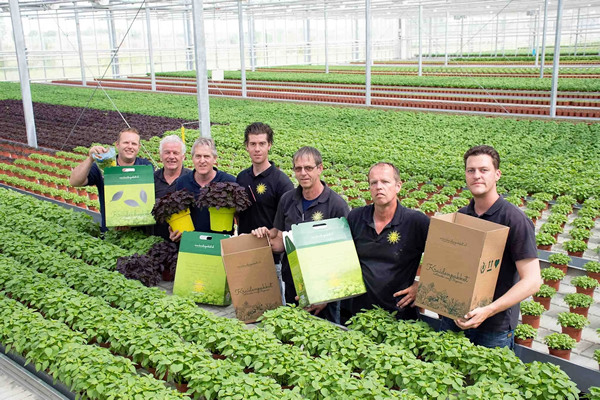
Down-to-earth people
"We have meetings twice a day, over coffee. Other than that, we never have meetings," jokes Erik. According to him, it is not hard to get everyone in the company to agree to something. "West Frisians are down-to-earth people; that helps. We sometimes have heated discussions while having our coffee. But by the time the coffee runs out, we have come to a consensus."
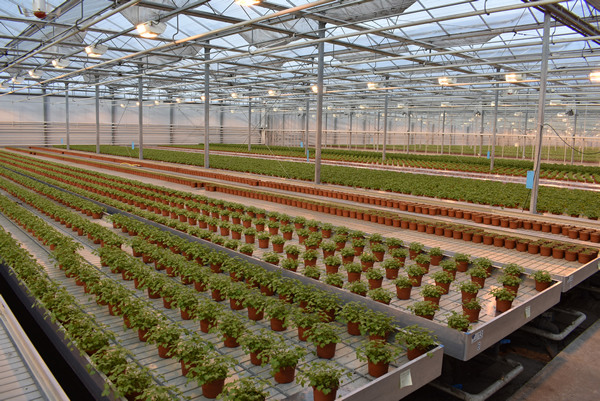
Buysman Kruiden takes care of its own herb sales. About 45% of its volume is sold to supermarkets. The remainder goes to wholesalers across the Netherlands. This herb nursery discovered a new sales channel last year - Floraholland. There, Buysman Kruiden has introduced a concept involving large pots of herbs. These include hanging pots of tea herbs.
The company's herbs also end up in neighboring countries. This is thanks to wholesalers and exporters. But, according to Erik, Buysman Kruiden is not interested in exporting their herbs, themselves, to far-off destinations. "We try to harvest our herbs fresh in the mornings. We can then deliver a fresh product to our clients. That is still possible for countries such as France, Germany, Belgium, and the United Kingdom. Further than that, it is quickly no longer viable."
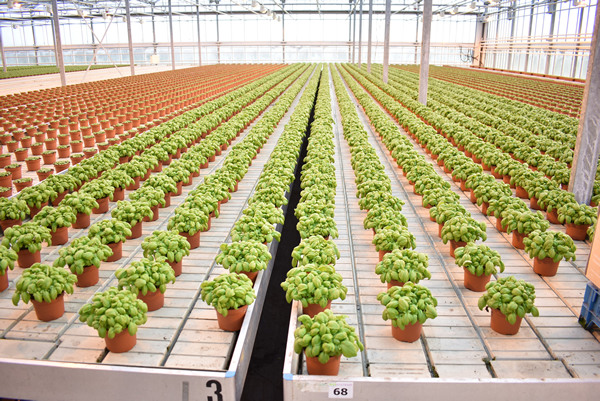
Buysman Kruiden cultivates a total of 11 kinds of fresh herbs. Six of these are grown the most. They are basil, chives, coriander, parsley, mint, and thyme. The herb they grow the most of, by far, is basil. Erik says there has been a significant increase in the overall demand for fresh herbs in recent years. According to him, that is mainly due to all the attention these herbs get on televised cooking shows. "Fresh mint sales, in particular, have taken off. This herb is used in, for example, tea."
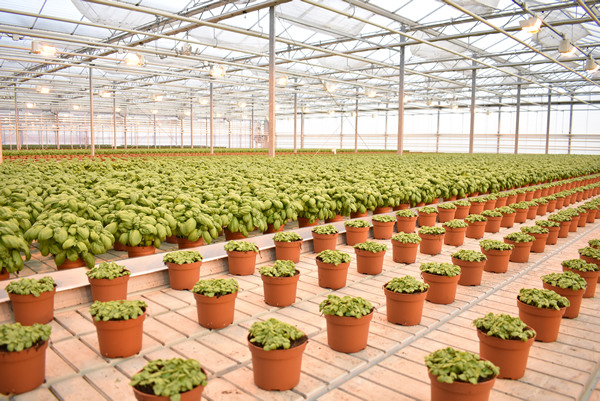
Over the years, Buysman Kruiden has grown into one of the three largest potted herb nurseries in the Netherlands. The company's prices are fixed throughout the year. "We are certainly not the cheapest. But, when you visit our greenhouses, you realize why our cost prices differ from those of our colleagues. We, for instance, have far fewer pots per square meter than is customary."
"This is all done to improve the herbs' quality. Our clients know they will get a very good product at a decent price. Of course, we experience huge price pressure from retailers. But our products' quality means not only the price is considered. In the end, it is better for everyone in the chain, including the consumer. The supermarkets also do not want any losses."
Pesticide-free
Erik does not see the business expanding into growing, for example, edible flowers. "When it comes to our assortment, we are of the 'keep to what you know best' school of thought. Cultivating flowers is a whole other specialty. We have also been growing our herbs, pesticide-free, for years now. That also makes us selective in the number of varieties we cultivate. We could, for instance, easily grow rosemary, but choose not to. This herb is very susceptible to pests. We can grow more varieties if so asked."
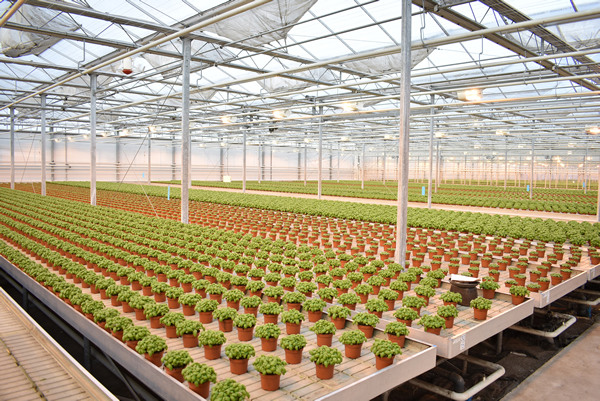
Switching to organic farming is still a step too far for Buysman Kruiden. "We do not use any pesticides anywhere in our company. But, we do use conventional fertilizers. These are needed so the plants can be optimally nourished. That still seems to be a difficult story when it comes to organic fertilizers," says Erik.
The nursery recycles all its water. "This helps us make optimal use of the fertilizers. Nothing ends up in the environment. We have about five million liters of water in the basins surrounding the business. Last year was extremely dry. But, even if we were to have another year like that, we would still not run out of water."
The anti-plastic debate is also not lost on Buysman Kruiden. But, as far as Erik is concerned, their herbs will still be packaged in plastic for the time being. "Much is being said about this. But, the product is not enveloped in plastic for no reason. Its function is to keep the product fresh. Now it seems that everyone has to switch to cardboard. But I wonder if that product's environmental footprint is any better. However, if the market demands a different packaging material, we will have to comply. We are, therefore, already looking at alternatives."
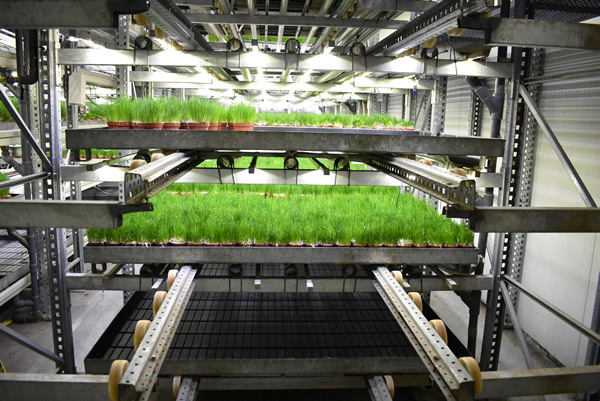
Most of this nursery's herbs are grown on cultivation tables. An ebb and flow system is used. These herb farmers grow only chives using the vertical farming method. "This is the perfect crop to cultivate in this manner. It is still to difficult to grow other herbs in this way," explains Erik. Three-quarters of their herbs are cultivated under traditional Son-t lighting.
One section of their facility is equipped with LED lighting. "We were one of the LED pioneers 15 years ago. It appeals to us. Each plant, however, needs a different 'light recipe' to meet our quality standards. So, along with our partners, we are now looking into the ideal light combination. We want to grow our other herbs under LEDs too."
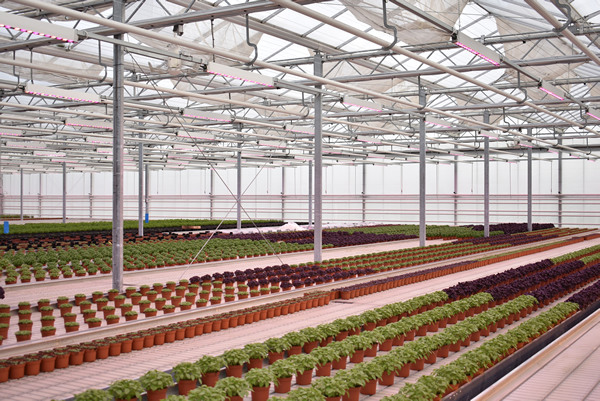
Cultivation under LED lighting
The production process is mostly done by hand. There are only two stages for which Buysman Kruiden uses a machine - filling the pots with soil and sowing the herbs. "It is very labor-intensive. But, in this way, we can take rapid action if something goes wrong with the herbs." This company supplies herbs to its buyers year-round.
The months between November and January are, however, usually a little quieter. That is with the exception of the festive season. "In April, the season starts in earnest. Then people place their plants outside. The barbeque is switched on, and people enjoy some tasty salads," concludes Erik.
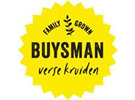 For more information:
For more information:
Buysman Kruiden
41 Kadijkweg
1619 PJ Andijk, NL
Tel: +31 (0) 228 597 161
Email: info@buysmankruiden.nl
Website: www.buysmankruiden.nl
